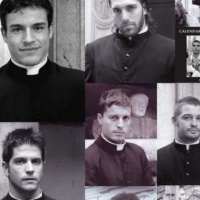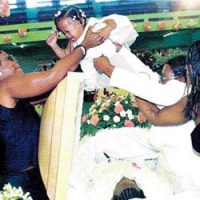(Proper 12B ) John 6, verses 1 – 13 In the well-known story of Christ feeding the five thousand, we come across two very different attitudes toward the situation from Jesus’ disciples.
- Firstly, when Philip saw how many people were there and needing to be fed he said ‘It would take two hundred silver coins! – about eight month’s wages – even to give them just a bite!’
Philip’s was a pessimistic faith. A pessimist is one who defines hope as wishing for something you know isn’t going to happen. Twin boys – one a pessimist, his brother an optimist – discovered where their parents had hidden their Christmas presents. There were two rooms one full of brand-new toys, the other full of hay and horse manure. Two children are taken into them, one a pessimist, the other an optimist. The pessimist looked at the first room and cried because all those wonderful toys would soon be broken. The optimist was in the other room shovelling. “I know there’s got to be a horse in here somewhere,” he said. A man said to a pessimist, “Isn’t this a bright, sunny day?” The pessimist replied, “Yes, but if this heat spell doesn’t stop soon, all the grass will burn up.” Two days later, the same man said to the pessimist, “Isn’t this rain wonderful?” The pessimist replied, “Well, if it doesn’t stop soon, my garden will wash away.” Philip represents someone with a pessimistic faith. He needed to see his faith for what it is — pessimism. Pessimistic faith sees money and human resources, and that is all. It sees only the available resources. It stresses hopelessness. It forgets God and his glorious power in the past and how that same power controls the present and future. It says that the problem is too big for God.
- Then, there was Andrew.
Andrew is an example of an optimistic, though questioning faith. Andrew was a follower of John the Baptist before he met Jesus. It seems that he always willing to take second place. He was not only the very first to follow Jesus, but he was also one of the very first to bring another to Christ (his own brother Simon Peter). But Andrew was called to take a back seat to Peter; he lived under his shadow. And throughout the New Testament, Peter is always mentioned first, but from all I can see, Andrew never resented his place. TO BE WITH JESUS AND TO DO WHAT HE WANTED WAS ENOUGH FOR HIM. “Here is a boy with five small barley loaves and two small fish, but how far will they go among so many”, he asked An optimistic faith but questioning faith loves the Lord and is committed to the Lord. Andrew sees Christ concern and he goes among the crowd and searches for food. HE FOUND AND GATHERED ALL THE RESOURCES HE COULD. An optimistic, but questioning faith lays what it can find before the Lord. No matter how little the resources or how poor the quality, it is placed all before the Lord. But the problem with an optimistic but questioning faith it does QUESTION. Whatever the need may be; we all need once again to learn to trust Christ and not question and doubt His love, care, and power in our lives.
Supremely, there is Jesus himself. Christ Himself demonstrates for us the kind of strong faith we are to have in God. He takes what He has and gives thanks to God for what He has which is a meagre supply of bread. In fact, He could hold all that had in the palm of His hand. Jesus gave what He had, and all He could do was distribute what was in His hands and trust God. This he did – simply gave what he had, and God did the rest. All any of us can do is give what we possess, what we hold in our hands [our lives, our time, our priorities, our gifts]. And if we so give, God does the rest. Our needs will be met. And as the story tells us, more than met.










